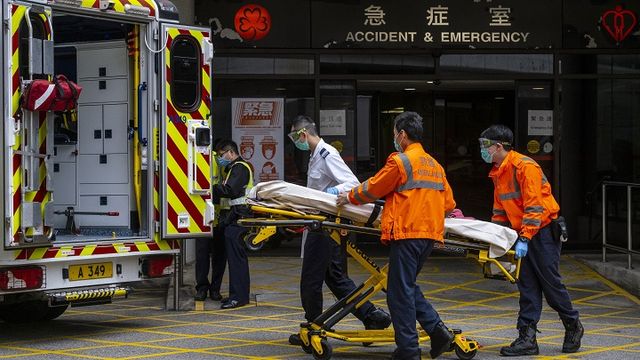(Bloomberg) — Efforts accelerated to contain the new coronavirus that has claimed more than 560 lives, with regions from Hong Kong to India putting in place more restrictions for travelers from China.
India Health Ministry said existing visas are no longer valid for any foreign nationals traveling from China. Hong Kong said it will quarantine all arrivals from China, while others including Australia, Taiwan and Vietnam have announced similar steps. Japan confirmed 10 more cases from a quarantined cruise ship.
In China’s Hubei province, the region wrestling with almost 20,000 cases, scenes of chaos and despair are emerging as residents cope with the modern world’s largest-ever quarantine.
Key Developments
- China death toll at 563; mainland cases at 28,018, with 3,859 severe
- Why Reports of Drugs for Coronavirus Are Premature: QuickTake
- What You Need to Know About the Spreading Coronavirus: QuickTake
- Terminal subscribers: Join a TOPLive Q&A on risks to the economy and markets on Feb. 6
Bloomberg is tracking the outbreak on the terminal and online.
China Car Sales May Fall Over 10%, LMC Says (12:48 p.m. HK)
China’s auto market, the world’s largest, may shrink 10% or more this year if the coronavirus outbreak persists through the third quarter, researcher LMC Automotive said.
That’s the worst of three scenarios outlined by the researcher and involves the virus undergoing further mutations and the epidemic not being contained until late in the year, LMC said in a note to clients. More likely would be for the outbreak to be under control by June, resulting in industry sales falling 3% to 5% in 2020, it said.
Carmakers are vulnerable because the outbreak’s epicenter is Hubei province, which is China’s fourth-largest auto-making hub.
China Offers Incentives to Firms Helping Battle Virus (12:09 p.m. HK)
China is stepping up efforts to contain the spread of the new coronavirus with a series of relief measures for companies directly engaged in the fight against the disease.
The steps include reduction in value-added taxes and nudging banks to offer loans carrying interest rates of less than 1.6% for key enterprises that produce, sell or transport essential medical products and daily necessities, China’s State Council said on its website last night. Separately, the nation’s airlines will also be exempt from a civil aviation fund fee starting Jan. 1, it said.
Commodity Shippers Face ‘Crisis in Demand’ (11:27 a.m. HK)
The global commodity-shipping industry faces an extremely challenging quarter as the impact of the coronavirus outbreak in China adds to other headwinds including seasonally low demand and the impact of recent fuel-rule changes, according to IHS Markit.
The spreading health emergency in Asia’s top economy, the world’s largest importer of iron ore, has sent shock waves through raw material markets, and the companies that ferry goods across the world’s oceans. Freight rates have swooned amid gathering indications that demand for cargoes will slump.
There are signs of congestion building up at ports, and reports mills are cutting output, Rahul Kapoor, global head of commodity analytics and research for maritime and trade, told Bloomberg Television.
Want to Avoid Virus on a Plane? Wash Your Hands (9:37 a.m. HK)
Forget face masks and rubber gloves. The best way to avoid the coronavirus on a flight is frequent hand washing, according to a medical adviser to the world’s airlines.
The virus can’t survive long on seats or armrests, so physical contact with another person carries the greatest risk of infection on a flight, said David Powell, a physician and medical adviser to the International Air Transport Association. Masks and gloves do a better job of spreading bugs than stopping them, he said.
Read the full story here.
Vietnam Quarantines Ships From China Ports: VietnamPlus (9:24 a.m. HK)
Ships arriving at Vietnam’s northern Haiphong city port that have visited China in the last two weeks will be quarantined to prevent the spread of novel coronavirus, news website VietnamPlus reported.
The regulation went into effect Feb. 4, the report said, citing a regulation of the port authority under the Vietnam Maritime Administration.
Japan Finds 10 More Cases on Cruise Ship (8:35 a.m. HK)
Japan’s Health Ministry said it found an additional 10 cases of the novel coronavirus on a quarantined cruise ship off Yokohama. That would bring the total number of cases on the vessel to 20.
The Diamond Princess was placed under quarantine this week before it reached Japan and checks were conducted after a passenger from Hong Kong who had been on the ship tested positive for the virus.
More than 7,000 passengers and crew are being held in quarantine in Hong Kong and Japan as their cruises turned into confinement. In Hong Kong, the cruise ship World Dream, owned by Genting HK’s Dream Cruises, was quarantined after three travelers who disembarked in China were diagnosed with the coronavirus.
The new infections bring to 45 the number of people in Japan confirmed to have the disease.
China Cases Rise Above 28,000 (7:33 a.m. HK)
The number of deaths in mainland China from the new coronavirus rose to 563 as of Feb. 5, according to the National Health Commission. That’s up from 490 previously. Confirmed cases jumped to 28,018.
China’s Hubei province reported 70 additional fatalities. Hubei, the center of the virus outbreak, has reported 549 deaths — 98% of the total in China so far. Hubei also is the region with the majority of infections. It confirmed 2,987 additional cases, for a total of 19,665 in the province.
Beyond mainland China, Hong Kong reported a death earlier this week, while the Philippines also has reported a fatality.
Large Testing Lab Opens in Wuhan to Find Cases (4:17 p.m. NY)
The Chinese medical technology firm BGI Group said it has opened a lab in Wuhan, where the outbreak is centered, that can test 10,000 samples a day to diagnose the coronavirus there.
Reports from Wuhan portray a health-care system overrun by the virus, potentially leading to significant underdiagnosis of patients. The new 2,000-square-meter (21,528-square-foot) Huo-Yan, or “Fire Eye” laboratory, promises to greatly accelerate testing cases to eliminate or confirm suspected infections as soon as possible, the Shenzhen, China-based company said Thursday in a statement.






